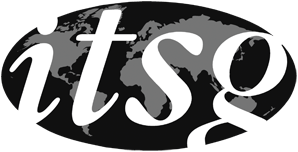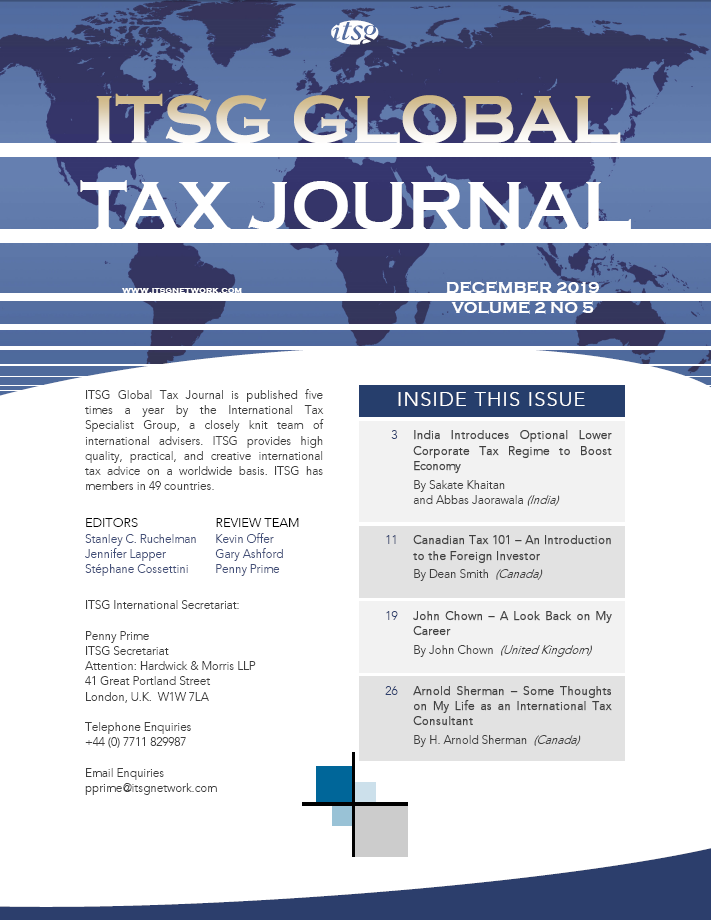Editor’s Note: Arnold Sherman is one of two tax advisers awarded Life Member status by the International Tax Specialist Group in recognition of a long and meritorious career as an international tax adviser. He was there when relatively few tax directors provided expert advice to their employers on cross border tax matters. Later on, he established his own tax advisory practice based in Calgary, Canada. Effective this month, Arnold closed his professional practice. At close to 89 years of age and having qualified as a chartered accountant in 1954, there are few cross border tax plans, if any, that Arnold has not designed, commented on, or improved.
My professional career as an international tax planner began in 1959, when I was promoted to take charge of the corporate income tax function of the Massey Ferguson (M-F) group of companies, headquartered in Toronto and quoted on the Toronto Stock Exchange. M-F had operating subsidiaries in about a dozen countries, manufacturing and distributing farm and industrial machinery.
While there had been limited attempts in earlier years to reduce the group’s overall tax liabilities, I saw my function as inculcating ‘tax consciousness’ both at the head office and throughout the operating subsidiaries. My approach was strongly supported by senior management. By the time I left the group at the end of 1977, I had achieved my target.
While working at M-F, I had a secretary (remember them?) but no tax professional staff. When tax compliance work, or work on matters of detail, was required, I engaged the services of tax managers from the accounting firm that handled M-F’s audit. The tax manager reported jointly to me and to a tax partner. A year or so after I left M-F, I passed through Toronto and was amazed to see an M-F corporate tax group of six professionals replacing me.
In those ‘good old days’, tax avoidance was not frowned upon as it is today. It was effectively a game played by those responsible for preparing tax legislation, on the one hand, and tax professionals employed by corporations and their tax advisers, on the other. Government employees wrote the law; we took advantage of loopholes, and they tried to close the loopholes as soon as they found out about them. Unlike the situation today, no ‘social morality’ was involved, and the concepts of ‘improper tax avoidance’ and perceived ‘abuse’ of tax legislation by tax advisers did not exist. The tax professionals’ objective was to minimise the tax liability of their client by legal means, thereby benefiting taxpayers and corporate shareholders.
To illustrate, let me describe one of my very successful tax plans: M-F agreed to purchase a large German company which had been manufacturing tanks during World War II but thereafter reverted to the manufacture of industrial and farm machinery. Canadian management forecast that the German company would incur significant losses for the first three years after acquisition. On the other hand, M-F’s U.S. subsidiary, primarily manufacturing agricultural tractors, was extremely profitable, even though it paid a substantial royalty to a related company resident in what we used to call a tax haven.
I had the U.S. subsidiary set up a German branch, which purchased the German assets. Three years of German branch losses then offset U.S. taxable income. A very successful plan, which was stopped thereafter by the U.S. Congress, which changed the law at the behest of I.R.S. to prevent the losses of foreign branches from being used to offset U.S. domestic taxable income in the context of a double deduction within a group. The loophole was closed as soon as it was discovered but too late to stop our plan. Today, since the plan was set up specifically to reduce taxes, with no other business purpose, it would almost certainly not have been considered unless combined with a business purpose having economic substance.
In 1978, I was invited to create, and head up, the tax function for a multinational group of companies based in Monaco and primarily owned by a single individual, Baron Heine Thyssen-Bornemisza, who was best known as an art collector. The group’s major subsidiary, based in the United States, was run from Monaco, but the I.R.S. refused to allow a deduction from U.S. taxable income for the operating costs incurred in Monaco. I was asked specifically to solve this problem, and I did so, as the loss of the deduction resulted in U.S. income tax of several million dollars annually.
Unfortunately, my solution required that two members of Thyssen-Bornemisza’s senior management based in Monaco, both U.S. citizens, would no longer be able to evade U.S. personal tax by (apparently) not filing U.S. personal tax returns. These individuals hired a major U.S. accounting firm to prove that my plan would not work. They were unsuccessful.
When I was asked to renew my three-year employment contract in Monaco, this was a factor in my decision not to do so but to return to Canada instead. When employed by a corporation, solving a problem at the cost of upsetting two of its senior employees is one of the hazards of international tax planning.
On my return to Canada in 1981, I was asked to head up the corporate tax function of Dome Petroleum in Calgary. At that time Dome was Canada’s leading locally owned and publicly quoted oil company.
My principal achievement there was to recommend a ‘triple dip’. Dome was planning to purchase a major fixed asset, so I prepared a plan whereby interest on the funds borrowed for the purchase would be deductible three times from taxable income. While I was certain that my plan would work, management got cold feet and only accepted a revised plan for a double dip. Even this would effectively offset tax by interest costs claimed in two countries.
Unfortunately, management decided to purchase a competing oil company soon thereafter. Over-borrowed, the banks called their loans and Dome Petroleum collapsed in 1982. I was let go, together with most of Dome’s employees and decided to set up a consulting company to practice as an international tax consultant.
My major client for about 20 years was the Bata Shoe Organization, run from Toronto and supervising related companies in about 90 countries, the majority based in developing countries. Bata employees had never in the past considered their income tax liability as anything other than a fixed cost, like the cost of electricity or water. There had been no significant tax planning at any level.
For the next 20 years or so, I travelled extensively, visiting all major subsidiaries, and most others, a number of times. I always made detailed notes following each visit and copied them to Toronto senior management. My first visit was always to explain to local staff and their tax advisers the concepts of tax planning and tax minimization. Subsequent visits all began by my asking the question of each company and its tax advisers: ‘How much tax have you saved the company since my last visit?’ In at least one case, the local tax adviser was mortally offended by my question, and a physical confrontation was avoided only by the action of the local audit partner, who told the tax partner that my question made sense! In some cases, such as this one, it was necessary to change the local tax adviser.
My fondest memory is of a visit to a Bata subsidiary based in an African country. I asked the local manager how he had settled the company`s enormous tax assessment based on gross income, which we had discussed on my previous visit. He said that they had paid U.S.D. $20,000 to the tax auditor. I told him this was not permitted and that I would have to report the payment to senior management in Toronto. He said, ‘But I have a receipt’, then he led me to a locked cupboard and took out the receipt, signed by the tax auditor, for me to copy and take to Toronto. The story has a sad ending. Shortly thereafter, the manager was killed in a plane crash – not unusual in Africa. I had one or two narrow escapes during my travels in Africa, while flying. It is impossible to calculate how much tax was saved by tax planning over the 20-year period. My personal guess is at least U.S.D. $20 million.
Mr. Bata senior, who ran the group successfully for many years, retired and was replaced by his eldest son, who unfortunately did not understand the concept of tax planning, did not like living in Canada, and moved the management of the group to Switzerland, where it remains.
While my consulting work for Bata took a great deal of time, I had many other clients during this period, including other shoe manufacturers. One specialty I developed was advising individuals and companies who planned to change their tax residence. I am still consulted from time to time about the required tax planning for such moves. I have worked over the years in over 70 different countries and have consequential knowledge of the tax systems and have worked with local tax advisers in these countries. This has helped a great deal when advising clients.
I wonder whether I could have had such a successful career in the current tax environment. The current concept of ‘unacceptable tax avoidance’ severely limits the possibilities of reducing tax liabilities by taking advantage of tax loopholes. Will future tax professionals be limited to tax compliance work? I doubt it! Creative tax planners will still find tax planning possibilities for their clients, whatever the obstacles. Hopefully, the battle between those writing tax legislation and those finding loopholes will never end, but the tax legislation preparers currently seem to have the upper hand. Nonetheless, as Persian philosophers wrote many centuries ago, this too shall pass.

 Login
Login




















































